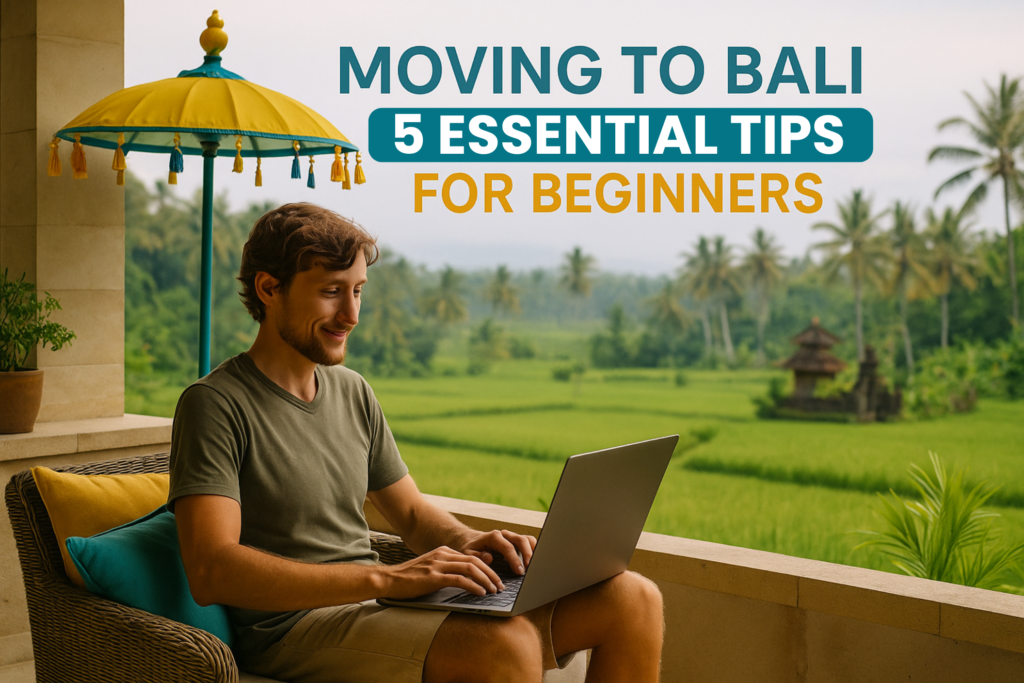





Moving to Bali: 5 Essential Tips For Beginners
Dreaming of relocating to Bali and starting a new life? Bali isn’t just known for its beautiful beaches and rich culture—it also offers a laid-back lifestyle that many people dream of. But before you make that leap, there’s one key aspect you need to prepare: your property in Bali.
Why is securing a property so important? Because it’s not just about having a roof over your head. The right property is the foundation for a comfortable, smooth, and fulfilling life in Bali. Where you live will affect your daily routines, your mood, and even your productivity.
1. Estimated Property Rental or Purchase Costs in Bali
Property prices in Bali can vary widely depending on the location and type of property. Popular areas like Canggu, Seminyak, and Uluwatu are generally more expensive than quieter, less tourist-heavy regions such as Tabanan, Gianyar, or Buleleng.
For up-to-date listings and market insights, you can check out professional platforms like @onbalivin or click here.
2. Choose a Location that Fits Your Needs
Before moving, consider the location of your future home. Do you prefer to be near the beach, close to the vibrant social scene, or would you rather reside in a peaceful and natural environment? Ensure that your location is accessible to your workplace or daily activities.
Here’s a breakdown of Bali’s administrative regions (as of 2025):
- Denpasar (Provincial Capital): The center of government and business.
- Badung Regency (Kuta, Seminyak, Canggu, Jimbaran, Nusa Dua, Uluwatu): Popular with tourists and expats.
- Gianyar Regency (including Ubud): Famous for arts, culture, and scenic landscapes.
- Tabanan: Ideal for those who prefer a rural atmosphere with rice fields and hidden villas.
- Bangli: Known for Mount Batur, Lake Batur, and Kintamani. A cooler, more serene area.
- Karangasem: Great for diving, relaxation, and a peaceful life. Famous beaches include Amed and Tulamben.
- Klungkung: Known for adventure and long-term investment, especially with popular destinations like Nusa Penida.
- Jembrana: Still untouched and very natural in the western part of Bali.
- Buleleng: Located in the north of Bali, known for the quieter Lovina Beach and peaceful atmosphere.
3. Then Choose Between Furnished or Unfurnished Properties
In Bali, you’ll find both furnished and unfurnished properties. Each has its pros and cons.
Furnished properties are ideal for those who want to save time and initial costs as they are ready to move in. This option is perfect for short-term stays, freelancers, expats, or digital nomads.
Unfurnished properties offer you the freedom to decorate and personalize your space according to your taste. They are generally more affordable than furnished properties, making them ideal for those planning long-term stays. With unfurnished properties, your furniture becomes an investment in your comfort and the overall quality of your living space.
4. Ensure the Availability of Essential Utilities: Water, Electricity, and Internet
Before settling in Bali, make sure you understand the availability and quality of essential utilities in the area you’re considering. Don’t just focus on the aesthetics of the villa or the view of rice fields and the ocean.
- For instance, Electricity in Bali can be unstable, particularly in remote or less-developed areas.
- Water quality varies; some areas rely on PDAM (local water service), while others use well water.
- As for internet, connectivity can also be inconsistent, especially outside major tourist areas. It’s important to check the best service providers in your area to ensure a stable internet connection for work and daily use.
Ensure that the infrastructure supports your lifestyle and avoids stress due to power outages, water issues, or unstable internet during important meetings.
5. Finally, Check the Building’s Condition and the Surrounding Environment
Bali’s tropical climate, with high rainfall and humidity, means that poorly maintained buildings can deteriorate quickly, leading to problems such as leaking roofs, moldy walls, or rotting wood. Pay close attention to the ventilation and natural light within the property.
Additionally, ensure that your chosen area is not too far from essential facilities like markets, clinics, or your workplace. Bali’s narrow roads can sometimes cause congestion, especially during peak hours. Also, make sure the area is safe from crime or natural disasters (such as floods or landslides).
💡 Important Reminder: Check Legality of The Property✨
This is not just a tip. It is the most important thing you must check: the legality of the property. Here’s why:
- To avoid legal trouble.
- Foreigners can’t own land, so you must use legal options like Hak Pakai or leasehold.
- Legal properties have proper documents, such as land certificates and building permits.
- Utilities like water, electricity, and internet are easier to access in legal properties.
- Legal checks help you avoid restricted zones.
- It’s easier to rent out or sell a legal property.
Conclusion: Preparing for Your Move to Bali
In conclusion, moving to Bali may seem like a dream—exotic beaches, a laid-back atmosphere, and a more balanced life. But to truly enjoy this new chapter, it’s crucial to be prepared, both financially and mentally.
By following this guide, you’ll be more confident and well-prepared for starting your new life in Bali. For updates on the latest property listings, living tips, or direct consultations, don’t hesitate to check @onbalivin.
 Bedrooms:
1
Bedrooms:
1
 Bathrooms:
1
Bathrooms:
1
 Bedrooms:
3
Bedrooms:
3
 Bathrooms:
3
Bathrooms:
3
 Bedrooms:
3
Bedrooms:
3
 Bathrooms:
4
Bathrooms:
4
 Bedrooms:
4
Bedrooms:
4
 Bathrooms:
8
Bathrooms:
8
 Bedrooms:
2
Bedrooms:
2
 Bathrooms:
2
Bathrooms:
2


























